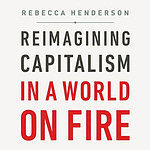On their way back to Prof. Stefan Eich's office after the interview, Tiger told Prof. Eich that he had been considering pursuing a Ph.D. because he values intellectual curiosity and derives a lot of joy from constantly learning about new ideas. Prof. Eich chuckled and told Tiger that academia might be one of the most anti-intellectual places of all because people are so focused on their niche and don’t interact with other disciplines enough. We've heard this criticism not only from Prof. Eich – or many other guests like Prof. Reinhard Busse – but almost every academic we've interviewed. People clearly recognize that the academia needs more people who can draw interdisciplinary connections. If one can bring financial economics, political theory, climate change, and many of the other fascinating debates together in a thoughtful way, this person is most likely a wonderful academic. And we believe that Prof. Eich is such an academic. While we don’t have the ability to do so yet, we do hope to build Policy Punchline to be as similar to a think tank as possible and bring different voices together. As we strive for that goal, we're excited to present this episode to you. Stefan Eich is Assistant Professor of Government at Georgetown University. Before arriving at Georgetown, he was Perkins-Cotsen Fellow in the Society of Fellows at Princeton University and received his Ph.D. in Political Science from Yale University. His research is in political theory and the history of political thought, in particular the political theory of money and financial capitalism. His book project, "The Currency of Politics: The Political Theory of Money from Aristotle to Keynes" (under contract with Princeton University Press), recovers debates about money as a constitutive political institution by studying six moments of monetary crisis and their imprint in the history of political thought. Besides its analysis of the conceptual and historical roots of the political theory of money the book offers an account of the modern politics of monetary depoliticization and places this history in conversation with the contested future of money. He is co-editor of a book series on "Currencies: New Thinking for Financial Times" with Melinda Cooper and Martijn Konings at Stanford University Press.
1×
0:00
Current time: 0:00 / Total time: -1:08:41
-1:08:41
Cryptocurrency, Financialization, and the Political Theory of Money
Sep 12, 2019














Share this post